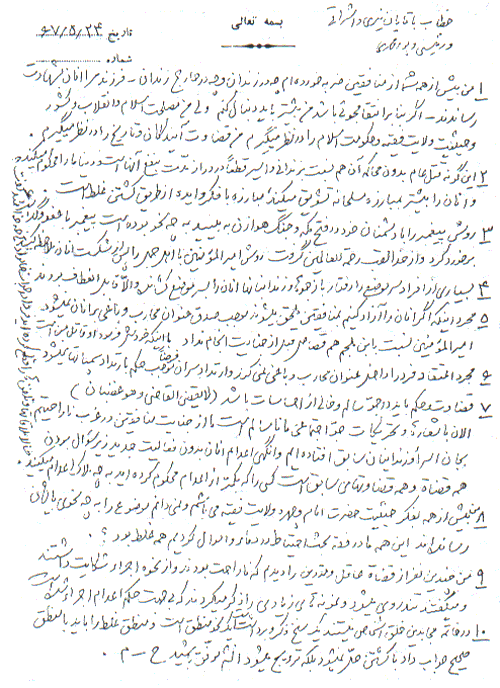Iran’s former Deputy Supreme Leader Ayatollah Hossein-Ali Montazeri, who was shocked by the mass execution of political prisoners in Iran in the summer of 1988, expressed his dismay in a letter to members of the ‘Death Commission’ in Tehran on August 15, 1988. While criticizing members of the Commission, he clearly stated that their conducts had been contrary to the teachings of Islam and the practices of the Prophet Mohammad.
The following is the full translation of his letter:
To Mr. Nayyeri, [religious judge], Mr. Eshraqi, [prosecutor], Mr. Raisi, [deputy prosecutor], and Mr. Pour-Mohammadi, [Intelligence Ministry representative]
Date: August 15, 1988
In the Name of God, the Most High,
1. I have received more blows from the Monafeqin [Mojahedin] than all of you, both in prison and outside.
My son was martyred by them. If it was a question of revenge, I should pursue it more than you. But I seek the expediency and interests of the revolution, Islam, the Supreme Leader, and the Islamic state. I am worried about the judgment that posterity and history will pass upon us.
2. Such massacres without trial, particularly when the victims are prisoners and those in captivity, will definitely benefit them in the long run. The world will condemn us and they will be further encouraged to wage armed struggle. It is wrong to confront ideas and ideologies with killings.
3. Look at the behavior of Prophet [Mohammad] and how he treated his enemies after the conquest of Mecca and the Battle of Hawazen. The Prophet showed mercy and amnesty and was given the title of “the Mercy of both worlds” by the Almighty. Look how Imam Ali treated his enemies after defeating them in the Battle of Jamal.
4. Many of these people who are holding fast to their beliefs are doing so in reaction to the way they have been treated by interrogators and prison wardens, otherwise they might have been flexible.
5. To argue that if we released these prisoners, they would rejoin the Monafeqin [Mojahedin] is not sufficient to characterize them as Mohareb (waging war on God) and of having mutinied against God. Imam Ali did not punish Ibn Moljem (his assassin), before he actually carried out the crime, even though he said before hand that he (Ibn Moljem) is my killer….
6. The beliefs of a person, per se, are not sufficient grounds to declare him as someone who is waging war on God or rebelling against A Damning Document 29 the Almighty. Even if it is supposed that the [Mojahedin] leaders are renegades, their supporters cannot be given the same verdict.
7. Judgment must be made in an environment free of emotions. The social environment now is not conducive to justice due to sloganeering and propaganda. We are upset with the Monafeqin’s crime in the west, but are taking it out on prisoners and former prisoners. Executing people who have not carried out any new activities will cast doubt on previous judges and all previous judgments. According to which standard do you execute a prisoner whom you have previously given a lesser sentence? At present, prison visits and telephone calls have been cut off, but how will you answer the families tomorrow?
8. I, more than anybody, care about the prestige of His Eminence the Imam as the Supreme Leader. I do not know how things are being presented to him. Should we say that all that we were studying in Islamic jurisprudence about taking caution when dealing with people’s blood and properties were wrong?
9. I have met with a number of just and pious judges who were dismayed and complained about the way the decree is being implemented. They said there is too much extremism and cited numerous cases of people being executed without any reason.
10. In conclusion, the People’s Mojahedin are not individuals; they are an ideology, and a world outlook. They have a logic. It takes right logic to answer wrong logic. You cannot rectify wrong with killings; you only spread it.
Hossein-Ali Montazeri

Download PDF version of Montazeri’s letter to members of the ‘Death Commission’ in Tehran

